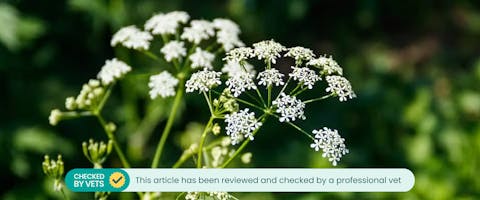Updated 09/08/2023
Otherwise known as Conium maculatum, hemlock is a pretty common plant that’s often found in open sunny areas, fields, and also on roadsides. This makes it likely you will come across it on a dog walk. You might then be wondering - is it safe for dogs to have a sniff (or even a nibble) or is hemlock poisonous to dogs? Let’s find out.
Trending posts
Purr-use some of the top blogs our members have been loving this month- Top male dog names for your new furry friendGot a new furry family member in your pack? Check…

- Top female dog names for your new fluffy palWelcoming a new pooch into your family? Explore…

- 120+ gray cat names your silver feline will loveRecently welcomed a fluffy gray bundle of joy into…

- What are normal pet sitting rates?Discover the average pet sitting rates for animals…

- Unique dog names to stand out from the packDare to be different with our list of the best…

Is hemlock poisonous to dogs?
Yes, hemlock is seriously poisonous to dogs - if you think your pooch has ingested even the smallest nibble of the plant, get them to a veterinarian as a matter of emergency. Hemlock can kill dogs within hours, so it’s super serious if they’ve ingested any part of the plant, no matter how little. It’s also worth knowing that there are two types of hemlock that could be fatal for your pup - poison and water. We’ll explore the symptoms of both kinds of toxicity below so that you know just how important it is to keep your pup away from any hemlock plant.
The good news is that most dogs will show no interest in this plant, with poisoning in livestock being far more common. However, some dogs just can’t resist putting anything in their mouths!
Hemlock poisoning in dogs
So, now we know that the hemlock tree is poisonous to dogs, let’s explore the symptoms that they’re likely to experience quite quickly after ingestion. We’ll also explore how your vet will assess your dog and the sorts of treatments that may be administered. It’s worth noting that as hemlock poisoning is so serious, your vet’s priority will most likely be to stabilize your pooch’s condition before taking the time to do super thorough diagnostics.
Symptoms
Water hemlock poisoning
- Excessive drooling
- Frothing
- Increased temperature
- Nervousness
- Coma
- Dilated pupils
- Increased heart rate
- Panting
- Twitching
- Rolling eyeballs
- Tremors
- Vomiting
- Convulsions
- Sudden death
Poison hemlock poisoning
- Ataxia
- Coma
- Convulsions
- Weakness
- Trembling
- Drooling
- Inability to breathe
- Frequent urination
- Blood in stool
- Dilated pupils
- Increased pulse rate
- Weakened pulse
- Sudden death
Diagnosis
As we’ve established, hemlock poisoning in dogs (and humans, by the way) is a very, very serious cause for concern. So, even if your pup isn’t displaying any of the symptoms above, get them to your veterinarian as a matter of emergency. While diagnostics like lab work are important, it’s likely that your vet will do everything they can to stabilize your pup’s condition before this is carried out.
If you’re able to, take a picture or bring in a sample of the plant in a sealed bag so that your vet can identify the plant that your pup ingested. Once your vet is confident that your pup’s condition is stable, it’s likely they’ll perform a blood test and urinalysis to check for any organ damage.
Treatment
The course of treatment your vet decides on will depend on a few factors, including the size of your pup, the amount of the plant ingested, and the speed at which the symptoms began. Unfortunately, there is no antidote for hemlock, so all treatments administered will be supportive. These include the use of IV fluids for rehydration and gastric decontamination, followed up with activated charcoal. If your pooch is experiencing breathing problems, then they’ll be supported through oxygen therapy. Medications may also be administered to control any convulsions. Sadly, the prognosis is guarded in dogs that have eaten hemlock, which means some dogs will die, despite treatment. So, to give your pet the best chance possible, get them to a vet immediately if you suspect they have eaten hemlock.
Meet our veterinary expert, Rebecca
This article has been checked by veterinarian Rebecca MacMillan, BVetMed MRCVS. Rebecca is a companion animal vet who has always had a passion for writing and client communication. Since her graduation from the Royal Veterinary college in 2009 she has gained a wealth of experience in first opinion small animal practice, in both clinical and managerial roles. She currently works in the South West and deals with a variety of routine and emergency appointments, but particularly enjoys medicine cases. Outside of work and writing, she enjoys spending time with her family, including her bouncy flat coated retriever George!
Other plants that are poisonous to dogs
Unfortunately, many plants around us are seriously poisonous to dogs, so get in the know starting with the list below.

